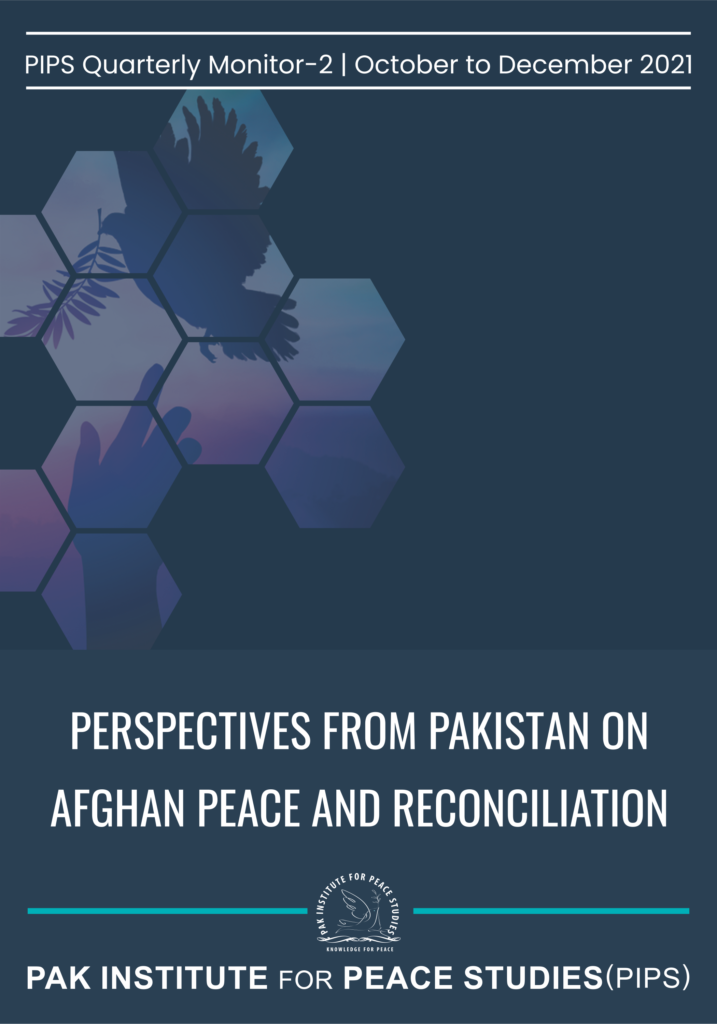Perspectives From Pakistan on Afghan Peace and Reconciliation 2

- After Study Hours: Exploring the Madrassah Mindset
- Education for peace and harmony
- Reconstruction of the National narratives and Counter-Violent Extremism Model for Pakistan
- Role of Post-Noon Engagements of Madrassa Students in Radical Orientation
- Promoting Inclusive and Tolerant Educational Narratives
- Islam, Democracy and the Constitution of Pakistan
- Minority Rights in Pakistan: Historic Neglect or State Complicity?
- “Creating an environment that counteracts militant ideologies and radicalism in Pakistan”
- Through Each Other’s Eyes
- The Role of Ulema in Promotion of Peace and Harmony in Society
- Critical Ideologies: A Debate on Takfeer & Khurooj
- سماجی ہم آہنگی ، رواداری اور تعلیم
- سماجی ہم آہنگی کیسے ہو؟
- اسلام جمہوریت اور آئین پاکستان
- پر امن اور متوازن معاشرے کے قیام میں علماء کا کردار
- اسلام جمہوریت اور پاکستان
- ایک دوسرے کے نظر سے
- مسئلہ تکفیر و خروج
- Media Safety in Pakistan
- تعلیم امن اور ہم آہنگی
- Regulating Broadcast Media: Challenges & Reforms
- Pakistan’s Sectarian Mire & The Way Forward
- Dialogue Pakistan 2019 report
- Pakistan’s achievements in war on terror but at what cost: a special review of the current decade
- Pakistan in changing world order
- Who Am I
- Academic and Intellectual Dialogue on Social Harmony, Tolerance and Education
- Youth Engagement in Pakistan: Baseline Evaluation and Way Forward
- Dialogue Pakistan 2020
- Strengthening Governance in Pakistan
- Youth Perspective on Society, Religion, And Politics
- Supporting the Afghan peace process: Pakistan’s position, interests and policy options
- Afghanistan as Seen from Pakistan I
- Afghanistan as Seen from Pakistan II
- Perspectives from Pakistan on Afghan peace and reconciliation 1
- Discourse with Balochistan Youth on Society, Religion, and Politics
- Perspectives From Pakistan on Afghan Peace and Reconciliation 2
- How Youth in Sindh View State, Religion and Politics
- Afghan Peace and Reconciliation: Pakistan’s Interests and Policy Options II
- Interfaith Relations in Pakistan Perspectives and Worldview of Youth in Punjab
- Pakistan’s CounterExtremism Challenge and Policy Recourse
- Afghanistan as Seen from Pakistan III
- Making Sense of Pakistani Youth How Youth in Pakistan View State, Society, Religion, and Politics
- PERSPECTIVES FROM PAKISTAN ON AFGHAN PEACE AND RECONCILIATION 3
- AFGHAN PEACE AND RECONCILIATION: PAKISTAN'S INTERESTS AND POLICY OPTIONS 3
- A Path to Peace
- Countering Violent Extremism on Campuses A Faculty-Oriented Policy Brief
- PERSPECTIVES FROM PAKISTAN ON AFGHAN PEACE AND RECONCILIATION 4
- Afghanistan as Seen from Pakistan IV
- AFGHAN PEACE AND RECONCILIATION: PAKISTAN’S INTERESTS AND POLICY OPTIONS 4
- POLICY BRIEF APRIL-JUNE, 2022
- Afghanistan as Seen from Pakistan V
- AFGHAN PEACE AND RECONCILIATION: PAKISTAN’S INTERESTS AND POLICY OPTIONS 5
- PERSPECTIVES FROM PAKISTAN ON AFGHAN PEACE AND RECONCILIATION 5
- Charter of Peace
- AFGHAN PEACE AND RECONCILIATION: PAKISTAN'S INTERESTS AND POLICY OPTIONS VI
- AFGHANISTAN AS SEEN FROM PAKISTAN-VI
- PERSPECTIVES FROM PAKISTAN ON AFGHAN PEACE AND RECONCILIATION 6
- POLICY BRIEF 2
- POLICY BRIEF October December, 2022
- Youth for interfaith harmony Newsletter 1
- AFGHAN PEACE AND RECONCILIATION: PAKISTAN’S INTERESTS AND POLICY OPTIONS
- PERSPECTIVES FROM PAKISTAN ON AFGHAN PEACE AND RECONCILIATION 7
- AFGHANISTAN AS SEEN FROM PAKISTAN-VII
- YOUTH AND THE SOCIAL CONTRACT IN PAKISTAN
- Pakistan’s Afghan perspective and policy options
- POLICY BRIEF January-March, 2023
- Charter of Peace
- PERSPECTIVES FROM PAKISTAN ON AFGHAN PEACE AND RECONCILIATION 8
- AFGHANISTAN AS SEEN FROM PAKISTAN-VIII
- AFGHAN PEACE AND RECONCILIATION: PAKISTAN'S INTERESTS AND POLICY OPTIONS 8
- AFGHAN PEACE AND RECONCILIATION: PAKISTAN’S INTERESTS AND POLICY OPTIONS 9
- Policy Brief April- May 2023
- POLICY BRIEF Jun- Aug 2023
- AFGHAN PEACE AND RECONCILIATION: PAKISTAN'S INTERESTS AND POLICY OPTIONS - 11
- Pakistan's Evolving Militant Landscape: State Responses and Policy options
- AFGHAN PEACE AND RECONCILIATION: PAKISTAN’S INTERESTS AND POLICY OPTIONS – 12
- TRENDLINES OF PAKISTAN'S SECURITY CHALLENGES
- Quarterly Newsletter Oct - Dec 2024
Pak Institute for Peace Studies has released its 2nd quarterly monitor on Afghanistan titled “Perspectives from Pakistan on Afghan Peace and Reconciliation.” It is the outcome of comprehensive monitoring and analysis of the opinions of different segments of Pakistani society and state institutions on the emerging Afghan situation and covers the period from October to December 2021. Besides providing short term relief in the form of aid, Pakistan needs to encourage socio-economic and institutional stability of Afghanistan that comes from within Afghanistan. At the global level world bodies and governments need to devise a balance between sanctions and assistance, thereby neither turning blind eye to Afghanistan’s institutional crisis nor disowning Afghan citizenry. These are some of the findings of this monitoring report, which is expected to improve knowledge-base and awareness of key stakeholders on Pakistan’s Afghan perspective by demonstrating a critical review of varying viewpoints, positions, mainly around emerging events and developments in Afghanistan and their implications for Pakistan and the region.

